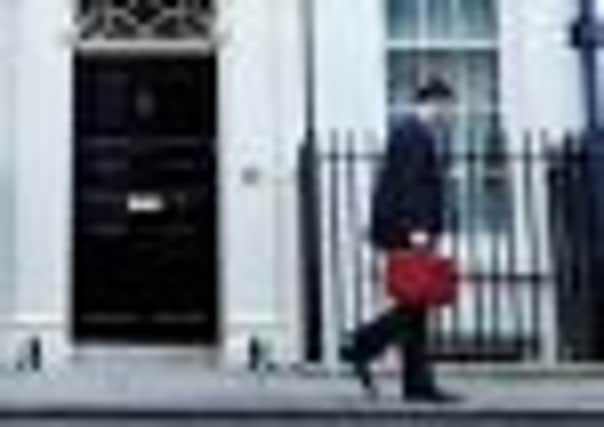Jonathan Reed: Osborne walks a fine line, but he must wait for judgment on his Budget legacy


At least George Osborne could walk out of the door of Number 11 yesterday knowing that he did not have to inflict the pain which accompanied his first Budget last year.
Many people are only now feeling the effect of the 2010 “emergency” statement, with public workers beginning a two-year pay freeze, thousands on middle incomes about to be sucked into the higher rate tax band and middle class benefits being eroded.
Advertisement
Hide AdAdvertisement
Hide AdIt was little wonder that Mr Osborne was eager to calm any nerves by quickly asserting that he would not be asking for more from the British people after getting to his feet in a packed Commons Chamber at 12.33pm.
By the time he sat down, the best part of an hour later, he had sipped through four glasses of water and survived several uncomfortable moments when his hesitant voice and delivery appeared to be on the verge of letting him down.
He may still be only 39 – and he is still not flavour of the month – but Mr Osborne has grown in stature during his 10 months at the Treasury.
The concerned whispers from the City and business leaders about his credibility and suitability for the job have largely been silenced, with his Commons performances more commanding. Facing bruising Shadow Chancellor Ed Balls across the Despatch Box will only stiffen Mr Osborne’s resolve.
Advertisement
Hide AdAdvertisement
Hide AdBut when your priority is getting the deficit wiped out and you, have just found out you were forced to borrow more than you hoped in the previous month, the challenge of producing a Budget to please is testing to say the least – especially when the Office of Budget Responsibility has just downgraded its forecast for the economy’s prospects.
Hence the big push for a package of financially-neutral measures which could get the wheels of the economy turning again – and the revenue flowing into the Treasury coffers.
Since launching their self-styled rescue mission, Mr Osborne and the coalition have shown themselves ready and able to wield the axe, but have rightly been criticised for lacking a vision for getting the economy growing again.
Regional development agencies – whatever their flaws – were scrapped in a chaotic manner and replaced with Local Enterprise Partnerships in similarly haphazard fashion. Ministers have taken a long time to realise that simply talking about rebalancing the economy was not necessarily going to make it happen.
Advertisement
Hide AdAdvertisement
Hide AdIf some of yesterday’s measures come to fruition – such as cutting pointless business regulation and fast-track planning to get businesses up and running – they could make a real difference.
The worry is that they sound much like the rhetoric we have heard before from Ministers in other enthusiastic young governments before they waved the white flag of defeat later on.
Mr Osborne has also won his battle against sceptical civil servants to push ahead with Enterprise Zones in the Leeds and Sheffield City Regions, although the results from previous experiences are mixed.
Economic Secretary Justine Greening spoke passionately about the idea at a post-Budget briefing. After all, she grew up in an enterprise zone in Rotherham – yet few would consider the town the ideal example of a story of economic success.
Advertisement
Hide AdAdvertisement
Hide AdA plethora of technical changes designed to breathe life into business seemed to even prove too much for Ken Clarke as his eyelids drooped, although an extra 1p cut in corporation tax brought a welcome cheer from MPs.
Businesses may have given the measures an immediate thumbs up – the CBI said it had declared Britain “open for business”, having criticised the Chancellor’s lack of plan for growth just a few weeks ago . This will have warranted a cheer back in Number 11.
But even a Chancellor stuck in a corner has to find a couple of sweeteners to hand out, especially when there is a coalition to please.
After all, most people – stung by the soaring cost of living – will be considering the impact on their own pocket this morning rather than the potential impact of increasing the small companies Research and Development Tax Credit.
Advertisement
Hide AdAdvertisement
Hide AdFew will quibble with a £45 tax cut next year when the basic rate threshold rises to more than £8,000 – not least higher rate earners who will also benefit this time – even if the heavy trailing of it by Treasury briefers removed any element of surprise.
That left help for motorists as the one genuine rabbit out of the hat. Blocking next month’s rise, which would have added 5p to a litre of fuel, was taken as read – cutting the duty by 1p was a nice little boost. But motorists’ joy may be shortlived when they realise that the price on the forecourt today will still be £1.31 a litre instead of £1.32 – despite hints of a much larger reduction.
It may be “helping families with the cost of living”, but when inflation is running away towards five per cent, it will not feel like much – especially if oil prices continue to rise with no mechanism to protect drivers.
Mr Osborne has garnered the headlines he was seeking with his cuts in fuel duty and tax, but his legacy will be judged by the ability of his Budget for Growth to assist the economy back to full health and stem the mounting tide of unemployment. The answer to that question may also go a long way towards dictating how many more times he emerges with the big red box on Budget day.
Jonathan Reed is the the Yorkshire Post’s political editor